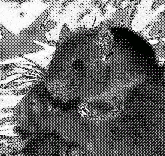THE RAT KING | Kerry Cullen.
fwriction : review.
⇒ S P O I L E R S _ B E L O W ⇐
It’s probably fair to say rats are the most baggage-ridden members of the animal kingdom, with the possible exception of the snake. I suppose the animal’s participation in various rat/flee plague-sharing ventures hasn’t helped their reputation, nor has the fact that they’re typically found in subway stations and piles of garbage and inside the walls of moldering houses.
Art and literature are the main culprits in the villification of the genus rattus — a lot of that art/literature is of the religious variety. Also, spreading bubonic plague, etc., hasn’t been the rat community’s greatest PR move. Anyway, over the centuries the rat has become iconic of all things debased, squalid, low-down, disease-ridden, and so on. But what’s great about literature is it’s versatility, and the ironic reversal of long-held cliches can be a very effective storytelling tool, as we see in Kerry Cullen’s “The Rat King.”
I’ll come back to the rat motif in a few paragraphs.
There are a few things I want to say about this great piece, which manages to be absurd and eccentric while also achieving an impressive emotional charge. First, let’s look at the story’s impressive opening:
I moved in with the rat king because things between my girlfriend and me fell apart. Of course, I mean this literally.
First of all, I love opening sentences that make me go, “Wait–what???” If you can make me think a thought that’s followed by not one but three ?’s, I will read on. I want to know who and/or what is the rat king, not to mention why would anyone want to live with someone named “rat king.”
But then the first section of the story doesn’t go any further with the rat-king thread, but instead tells us about how the relationship between the narrator (Loretta) and her unnamed girlfriend (Her) fell apart–literally.
Which is a great little mini-narrative that’s totally effective even without giving us any actual information about the emotional landscape of this relationship. The narrator cites three examples of literal breakage that bring about the termination of this relationship: a necklace, a dress, and a cup. Even though these are basically just trinkets, their destruction reifies whatever emotional turbulence took place in the relationship, allowing the author to use simple physical “gestures” to perform the more complex process of a relationship’s collapse.
It reminds me of a sketch I once saw, something done by a famous artist (Van Gogh, maybe? I forget). It was a sketch of a ballerina composed of only four or five little lines, little squiggles at first glance. But the longer you observed this image, the more alive it became. The seemingly random squiggles actually conveyed the movement and physicality of this dancer, perhaps as well as a more detailed, realistic depiction would.
So that’s what’s happening in the first section of this story: three simple acts of literal breakage tell us everything we need to know about the two characters’ interpersonal rupture. It’s a very impressive opening.
But I also want to talk, of course, about the Rat King. As you know (since you’ve read the story, haven’t you?), Loretta ends up moving in with and developing feelings for the rat king–a guy who mysteriously attracts legions of rats and, in a way that’s both creepy and somehow touching (?), communes with these furry little cliches.
Readers will likely draw a parallel between Loretta–a voluntary pariah, a destroyer, and a generally lost individual–and the rats that orbit the rat king. The story gives us plenty of pretext for this reading, but it also gives us the option to read rats as far more than a pack of scampering Health Code violations.
We can certainly read Loretta’s affinity with the rats as a sign of her own low self-worth, but we can also strip these creates of their centuries-old cultural baggage and see them as essentially innocent, vulnerable creatures within a large, hostile environment (the city). And this makes both the rats and the narrator far more sympathetic.
Sure, we can’t expect this rebound hook-up to be a healthy relationship. But none of us entered this story hoping for well-rounded, emotionally mature characters, did we? What’s the fun in that.
